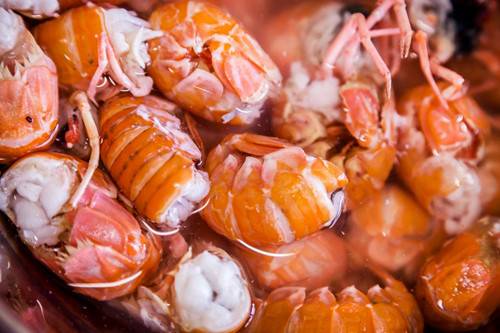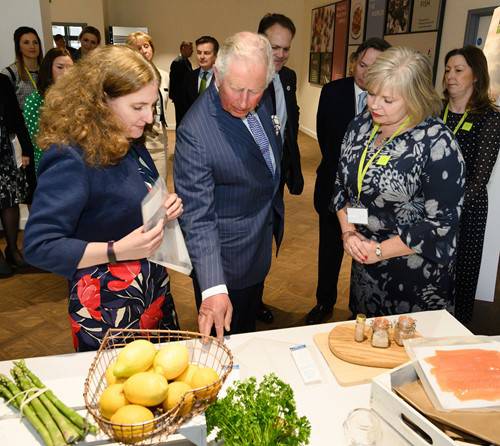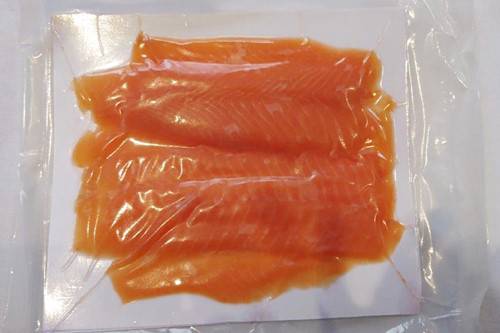CuanTec is making waves in the fight against plastic pollution
30 Jul 2020 • 4 minute read
Scottish blue biotech company, CuanTec is working towards a world where all food packaging is compostable.

Think of a world where all food packaging is compostable and the difference that would make to the health of our marine ecosystems. Scottish blue biotech company, CuanTec is already working towards that vision with international partners.
Plastic pollution - a global challenge
The world is creaking under the weight of our own waste with more than 50 years of plastic pollution. By 2050, it's estimated there could be more plastic in our oceans than fish by weight. That’s a shocking statistic.
Much of this waste comes from single-use plastic, such as food packaging. Discarded plastics that make their way into our rivers and oceans break up into microplastic fragments that do not readily breakdown into harmless molecules. These microplastics can both absorb and give off chemical and harmful pollutants and easily enter the marine food chain and wreak havoc.
Scottish biotech company CuanTec’s innovative team is simultaneously opening the potential of the sea and helping eradicate the more than 8.8 million tonnes of plastic that end up in our oceans each year. The company has developed a revolutionary solution to plastic pollution – it’s turning waste shellfish from the fisheries industry, which would normally go to landfill for disposal, into flexible, biodegradable, compostable and anti-microbial food packaging, which reduces waste to landfill and makes food last longer.
The biomaterial that CuanTec produces is a direct replacement for plastic, using natural materials to replace materials that are in everyday use.
World first for CuanTec
Chitin is the second most abundant natural occurring biopolymer in the world, found not only in shellfish but also in the likes of mushrooms and even insects.
CuanTec’s clever team has developed a world-first method of biologically extracting chitin from waste langoustine shells, taking its derivative chitosan and formulating it into different products that have potential use in the food and pharmaceutical industries.

The method uses fermentation, like the way beer or yoghurt is made – a process that’s gentler and kinder to the environment, cost-efficient, requires less heat and uses 95% fewer chemicals than conventional chemical-based approaches to chitin extraction.
Processing Scotland’s seafood creates a lot of waste from the bits of scampi we don’t want to eat, such as heads, shells and claws. This leads to tonnes of waste being sent to landfill or incinerated and releasing tonnes of CO2 and other harmful gases into the environment. By extracting chitin, CuanTec is saving all those emissions.
International collaboration
CuanTec are working with international partners to research and develop new uses for bioplastics like single use milk bottles or packaging for beer cans that’s friendly to the environment, or an improved, reusable plastic water bottle.
The company’s partners include the Scottish Association of Marine Science (SAMS), Versatile Packaging in the Republic of Ireland and Northern Ireland firm, Kilkeel Seafoods. The collaboration project was awarded co-innovation funding through the EU Co-Innovate Programme, as well as two of Scotland’s economic development agencies, Highlands and Islands Enterprise and Scottish Enterprise.
Meanwhile, UK supermarket giant, Waitrose & Partners has joined forces with CuanTec to work on a new film for food packaging made from waste langoustine shells.
Waitrose hopes the new packaging can be used as an alternative to conventional plastic film on some of its fish products from as early as 2021.

Pictured is CuanTec with HRH Prince of Wales visiting Waitrose HQ in April 2019.
Less waste to landfill
The technology is a good example of circular economy as the food packaging film will meet the needs of the fresh seafood market in the first instance. As well as protecting food on sale to consumers, it gives value to what would have been a waste product and takes single use plastic out of the food system, meaning that less waste goes to landfill.
Home-compostable food packaging
In look and feel CuanTec’s product is very similar to plastic packaging however this where the similarity ends. As its product is fully home-compostable it will not leave a lasting impact on the environment like standard plastic. It will breakdown, within around three months, to its natural components which can help the soil.
It’s taking chitin from nature and returning it to nature, without any environmental damage.

Future circular economy
CuanTec’s material has the potential to be both industrially and household compostable. The company is already looking into developing chitin extraction methods from other bio sources.
The company is also looking at how to recycle the waste that comes off the fermentation process itself – it’s high in protein and it includes the natural colourant from the langoustine that has the potential to be turned into feed for salmon.
This would effectively make the company a zero-waste company – the perfect circular economy.
With labs in BioCity, Motherwell and the European Marine Sciences Park, Oban, CuanTec is a rapidly expanding company that takes the best of chemistry and biology and combines them into innovative solutions to protect the planet.
You might also be interested in
-
Biofuel from whisky by-products
How Scottish biotech company, Celtic Renewables is turning whisky by-products into sustainable chemical products with uses worldwide.
-
Emerging climate technologies
Scotland is poised to take a leading role in developing new technology that can help meet the challenge of global climate change.
-
Innovation in Scotland
Scotland provides the perfect ecosystem for innovation – with the right skills and expertise, strong networks and commitments from universities.
We're here to help
Whether you're looking to locate your sustainable low carbon business in Scotland or need help finding suppliers to work with.
